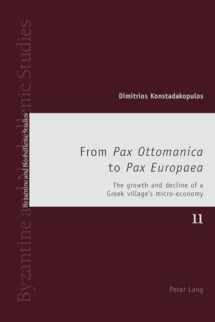
From «Pax Ottomanica» to «Pax Europaea»: The growth and decline of a Greek village’s micro-economy (Byzantine and Neohellenic Studies)
Book details
Summary
Description
The macroeconomic development of south-eastern Europe has been profoundly affected not only by the region’s major historical events – for example, liberation from the Ottoman Empire, the outbreak of civil wars, and the birth of new nations – but also by global events, such as the world-wide conflicts of the twentieth century, and the recent transnational processes of globalisation and European integration. The rationale of this book is to employ a comprehensive micro-history – that is, the history of one particular community: in this case, the village of Tsamantas, in north-western Greece – as a means of providing a detailed picture that will permit extrapolation to a wider context. Situated in one of the most isolated parts of the region of Epirus, Tsamantas has a complex history and a rich folk culture. At times, it has been a textbook example of how decision-making within a community can impact upon the success of the local economy. Its inhabitants have been rational problem-solvers, with a sense of what is in their family’s best interests, rather than passive victims of circumstance, and their choices at critical points in the village’s history have resulted either in growth or decline. The author focuses his groundbreaking analysis on these choices, drawing upon publications, archived materials, and illuminating oral accounts of local events.


We would LOVE it if you could help us and other readers by reviewing the book
Book review



